Nail fungus varnishes are an effective form of topical preparation that allows you to quickly fight mycosis, returning your nails to their natural appearance. Effectiveness is associated with the ability of the active substance to penetrate deeply into the nail, affecting all layers of the plate. As a result, fungal spores die without the possibility of recurrence.
The good and the bad
The first advantage of the product is its high efficiency. Thanks to the liquid structure, the product penetrates deeply. It completely stops fungal spores. This eliminates the possibility of recurrence of the disease.
Other advantages of this release form:
- Completeness of protection. After the solution dries, a film is formed. It does not allow air and moisture to pass through. The film prevents oxygen from entering the infected microflora. As a result, the vital activity of microorganisms is stopped.
- Safety. Fungicidal varnishes are characterized by minimal negative reactions.
- Long term. Medicines are applied several times a week. If you skip the procedure, its effectiveness will not be greatly affected.
- Versatility. They are effective in the treatment and prevention of onychomycosis. Dermatologists can prescribe remedies for those at risk. These are increased sweating, foot pathologies, special work.
The disadvantages of varnishes for nail fungus include the high price. Among the components of some species there are toxic compounds. Therefore, they may be undesirable for children. Another limitation may be pregnancy.
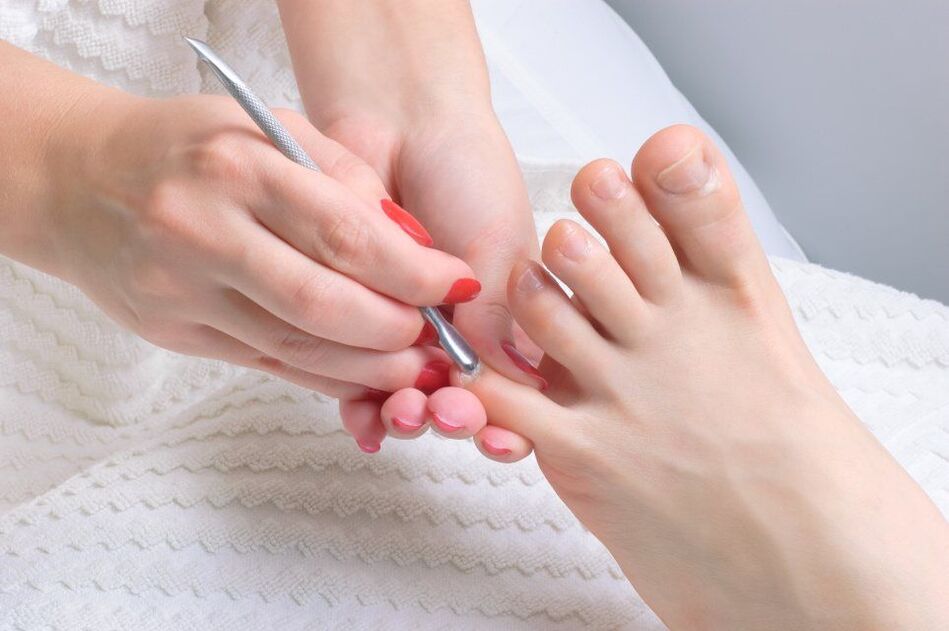
General application rules
Before applying the anti-fungal nail polish, you need to rinse the problem area thoroughly. Use laundry soap or an antibacterial agent for processing.
It is important!
The surface of the nail plate must be free of oil. To do this, use the product together with an anti-fungal nail polish.
It is acceptable to use diluted alcohol or iodine.
The following are recommended:
- Dry your feet thoroughly and wipe the nail plates. Then it is sanded with a nail file. It is important that the nail is not long. It should be cut as carefully as possible;
- Apply the product in a thin layer. The required application frequency is indicated in the instructions for use;
- Wait for the composition to dry;
- Disinfect all pedicure accessories. This applies to nail files and scissors. In this case, it will be possible to avoid recurrence of the disease and secondary infection with fungus.
No anti-fungal colored nail polishes. Can be applied under cosmetic varnish. For this, the plate should be firm and the stage of the cork should be primary or middle.
Contraindications
It is not recommended to use during pregnancy. The same applies to breastfeeding. Another restriction is children under the age of four.
It is undesirable to use if there is an individual intolerance to the components. In such cases, you should consult a cosmetologist or dermatologist beforehand.
Do not use varnish on cuts, burns, scratches or other damage to the skin around the nail.
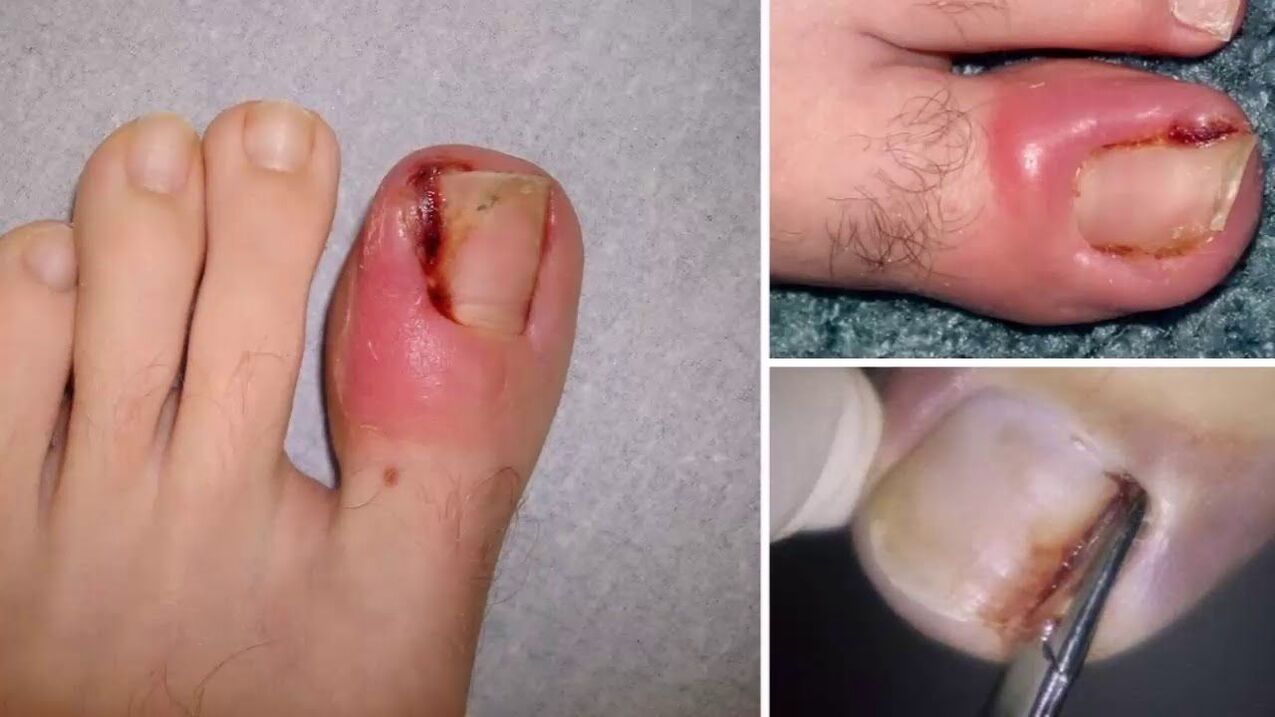
Contraindications to the use of anti-fungal varnish
List of the most effective drugs
Among the most effective drugs are Exoderil, Onihelp and others. Their price is between 700-800 rubles. For 2. 5 ml.
Varnish with the active ingredient amorolfin hydrochloride (5%).
The main component is amorolfine hydrochloride (5%). Excipients: ethanol, triacetin, ethyl acetate. It is effective against dermatophytes, yeast and mold fungi. It helps even with non-susceptible species, eg Micorales. It is suitable for use in the initial and later stages.
It is a transparent solution in terms of release form. The application should be as follows:
- Lacquer is applied to the affected plates once or twice a week;
- First, remove and file the nail to its minimum length. It is also necessary to degrease the plate in advance;
- Varnish is applied with gentle movements. The skin is not touched. After treating the affected tiles, the product must dry. This will take three to five minutes;
- The treatment should be carried out until the nail is completely healed.
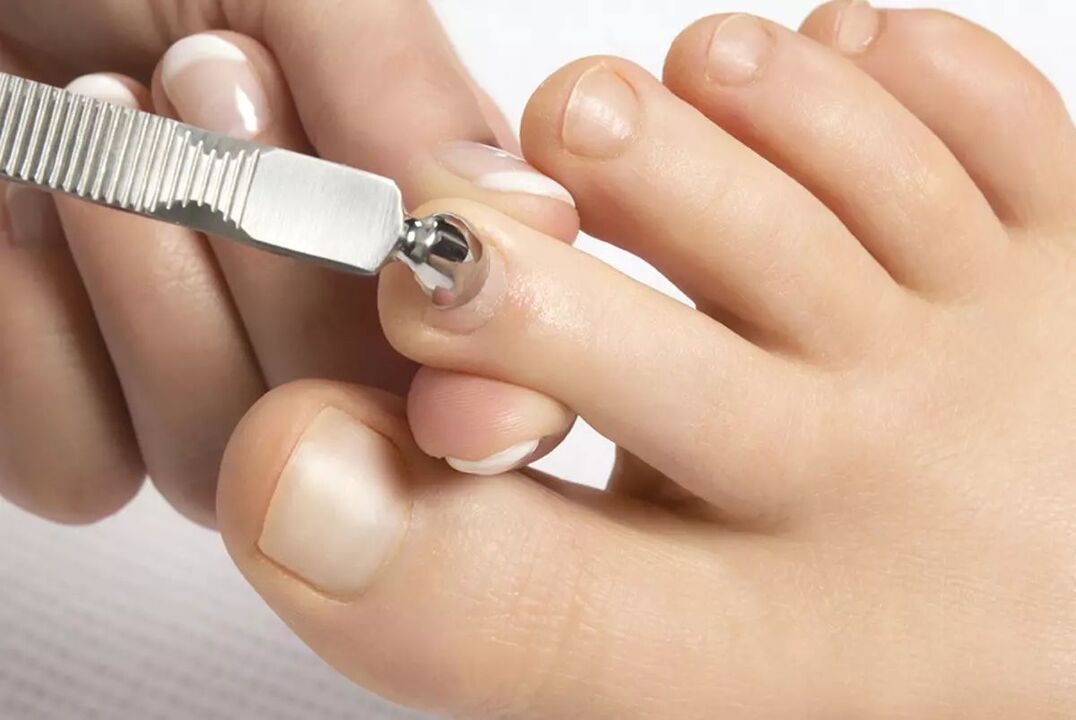
If you are allergic to the main and additional components, the use of varnish is unacceptable. Another restriction is age below 18 years. Adverse reactions are rare. Redness or mild itching will disappear on its own, after a maximum of 24 hours.
Varnish with the active ingredient amorolfin (5%).
The main component is amorolfine (5%). Excipients: triacetin, ethyl acetate, anhydrous ethanol. It is a colorless varnish in terms of release form.
It is characterized by a wide spectrum of activity. Effective against yeast and mold fungi. It is used for demorphic microorganisms, dermatophytes. Treatment is acceptable in the initial and later stages.
Use an antifungal medicated nail polish to apply to the affected plates:
It should be dried after processing. Then you can put on socks and shoes. Be sure to disinfect the applicator, file and scissors used during the treatment.
Therapy is carried out for three or more weeks.
Note!
An absolute contraindication is an allergy to the product's components. Relative restriction is related to pregnancy and breastfeeding.
Adverse reactions rarely develop and go away on their own.
This varnish is not used for preventive purposes. Designed to treat problematic nail plates.
Lacquer with active ingredient terbinafine (1%)
It is available in the form of solution, cream, spray and tablets. The active ingredient for each release form is terbinafine (1%). The component makes it impossible for the fungus to multiply and destroys the infectious lesion. Additional components in the composition: benzyl alcohol, sodium hydroxide, purified water, other types of alcohol.
The most effective varnish against nail fungus is at the initial stage. It is used for dermatomycosis and candidiasis. The list of events is as follows:
- The legs are pre-steamed and cleaned;
- Varnish is applied in a thin layer, adjusted - it should completely cover the affected area;
- Treated areas should not be washed for 24 hours.
If more than 50% of the nail is affected, there is no point in using the drug. Contraindications are alcohol addiction, acute vascular disorders, kidney and liver failure. Adverse reactions may develop. Itching, redness and burning disappear on their own. If hives appear, see a dermatologist.
Lacquer and cream with active ingredient amorolfin (5%).
It is available in the form of cream and varnish. In both cases, the main component is Amorolfine (5%). Additional components: triacetin, butyl acetate, absolute ethanol. Thanks to the formula, the process of reproduction of fungi is completely disrupted.
Lacquer is used to treat nail fungus due to dermatophytes, mold and yeast infections. Preferably in the initial stage of mycosis. However, if more than 66% of the area is affected, the product will not be effective.
Use the fungicide agent as follows:
- The surface of the plate is cleaned and degreased. Use a tampon moistened with alcohol;
- Problem nails are treated before each use of the drug. Use a nail file and remove the remaining varnish layer with a buffer;
- The applicator is lowered into the lacquer bottle. Then, carefully remove it. The excess is not rubbed into the neck of the bottle;
- Apply the varnish in an even layer using the applicator. Apply to the entire surface of the affected plate. Each nail is treated in this way. The varnish dries in three minutes.
Contraindicated in case of sensitivity to the components of the product. Adverse reactions develop very rarely. They pass on their own. Loceryl is recommended for therapeutic and preventive purposes.
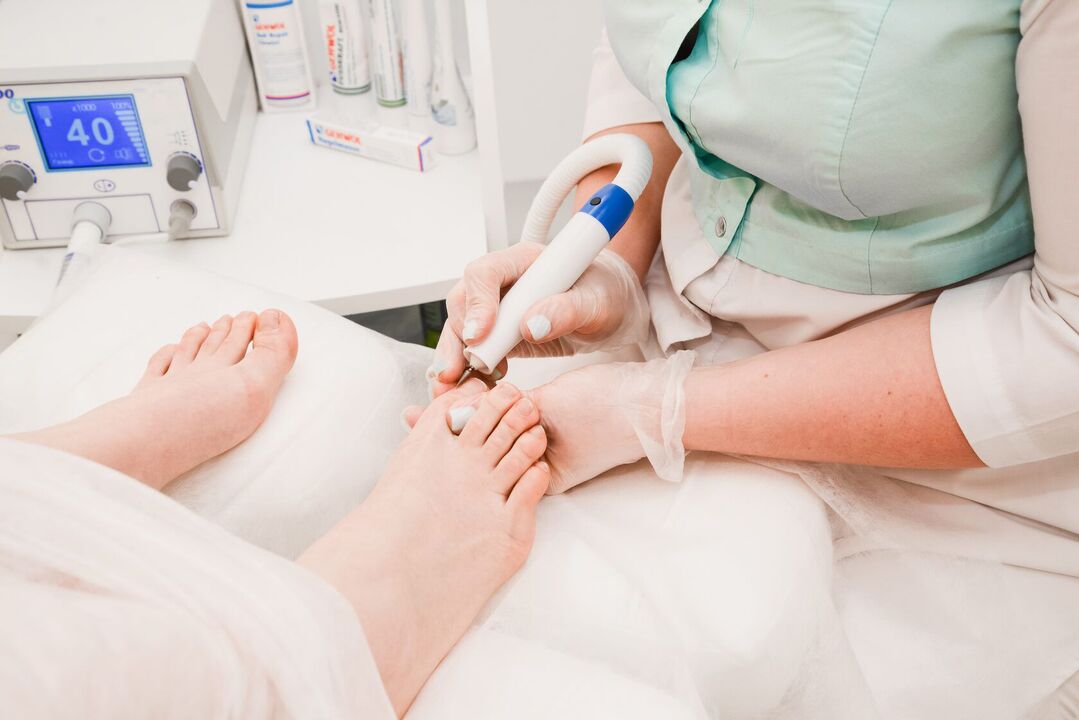
Lacquer with active ingredient naftifin (1%)
This is an anti-fungal nail polish, its active ingredient is naftifin (1%). In addition to varnish, there is a cream with a similar composition. Excipients: ethanol and purified water.
It is effective in the treatment of dermatophytes and mold. The application is as follows:
- Feet are washed and dried;
- Cut the nails as much as possible, slightly loosen their structure with a nail file;
- Varnish is applied in an even layer - it is allowed to touch adjacent areas of the skin.
Treatment is unacceptable for allergy sufferers. It is undesirable to use the plates on damaged, pus-filled or infected areas. Adverse reactions are reversible. Often this is redness, itching, peeling. They disappear on their own within 12-24 hours.
Varnish with the active ingredient amorolfin hydrochloride (5%).
Another anti-fungal nail polish. Available in cream and spray form. The main component is amorolfine hydrochloride (5%). Additional ingredients: triacetin, absolute ethanol, ethyl acetate.
On a note!
The most effective in the treatment of yeast fungi and dermatophytes.
It is used for dimorphic microorganisms. Usage should be as follows:
- Varnish is carefully applied to the pre-cleaned plate;
- First, make sure there are no damages or cracks;
- You can use two layers of the product - the first is applied after the second has dried.
Treatment is unacceptable in children who are allergic to components. Adverse reactions are rare. Hyperemia or burning passes by itself.
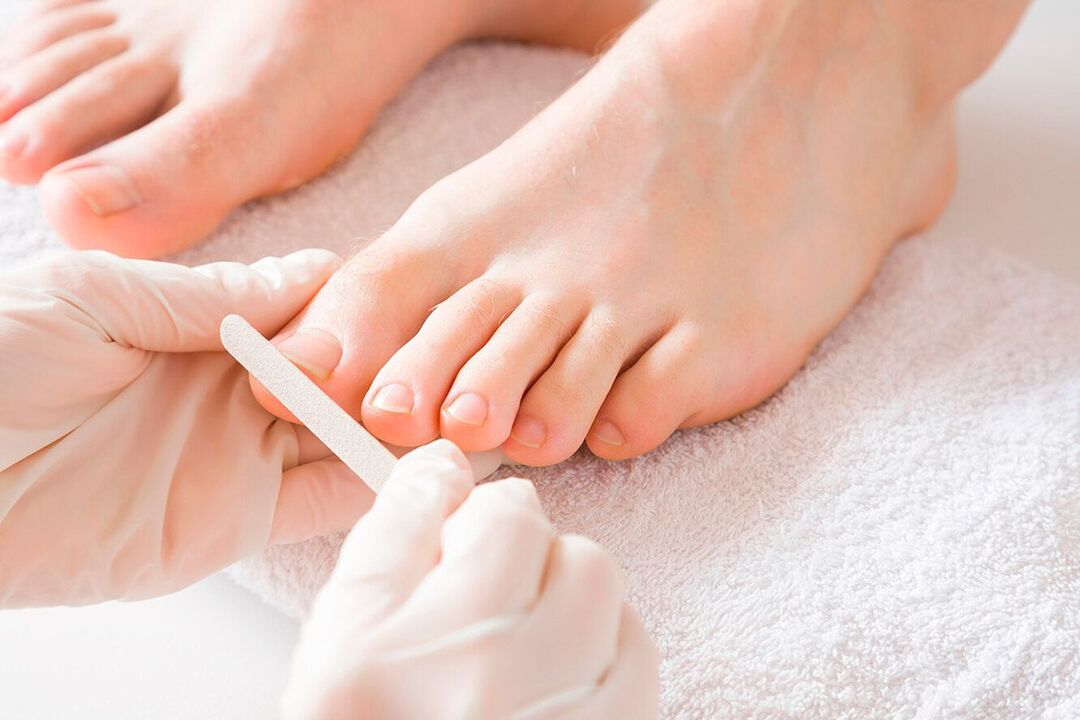
Inexpensive but effective antifungal varnishes
The fungus can also be combated using more accessible means. There are no less effective drugs among them.
Lacquer with active ingredient cycloperox (8%).
Perhaps the best and cheapest varnish for nail fungus. It is available in the form of varnish and cream. Active substance: cicloperox (8%). Auxiliary components are isopropanol and ethyl acetate. The drug is effective against dermatophytes, candidiasis and mold fungi.
Used externally:
- Varnish is applied to the problem nail with a thin layer. Do this once every day for the first month;
- In the second month - twice a week, in the third - once in seven days;
- During the week, say on Saturday, the varnish is removed. A special solvent is used for this;
- Therapy continues until complete recovery.
Contraindications: allergy to components, childhood, pregnancy and lactation. Adverse reactions are possible. Hyperemia, itching and burning disappear by themselves.
Varnish with active ingredient formic aldehyde 5%
Available in varnish form. The main component is paraform (formaldehyde 5%). Additional components: polyvinyl acetate emulsion, a mixture of proteins and enzymes.
Apply varnish every day for a month. Fights mold and yeast fungi, candidiasis. Application:
- The nail is processed, the plate is cut as short as possible;
- The top layer is removed using a nail file;
- Dry the nails, apply a thin layer of varnish evenly;
- The composition must dry.
The varnish has an effect immediately after application. It can be used for prevention. Contraindications: pregnancy, breastfeeding, sensitivity. Side effects: itching and redness of the epidermis.
Oil-based varnish
It is available in the form of varnish and oil. Fights only dermatophytes. It is not used for the treatment of intermediate and advanced stages. Prevents the spread of infection to large areas of the nail.
The composition includes oils (almond, lavender, jojoba). There are also oil solutions of vitamins.
Contains keratin, silicon and coral extract.
Lacquer is used in this way:
- Plates, cuticle and phalanges are treated with chlorhexidine. If not available, other antiseptics are used;
- Varnish is applied in two layers;
- It is allowed to partially touch the area with the cuticle.
Contraindications - allergy to components. It should be used with caution during pregnancy and breastfeeding. Possible side effects are redness of the skin around the nail, itching.
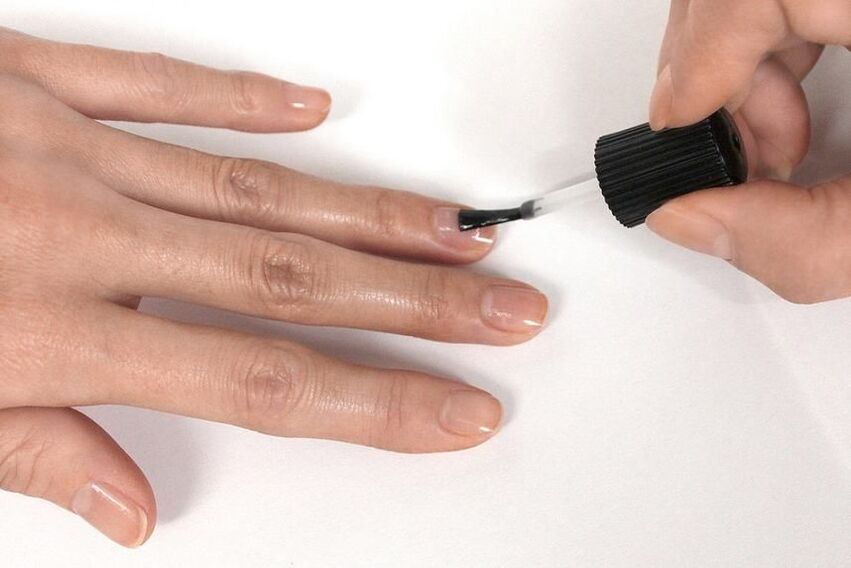
Varnish with active ingredients clotrimazole (1%) and ciclopirox (8%).
It is available in the form of gel and varnish. The main components are clotrimazole (1%) and ciclopirox (8%). It helps to cope with onychomycosis, which occurs on the background of candidiasis, as well as dermatophytes in the initial stage.
Treatment is carried out according to a certain algorithm:
- Used every day for the first month. Apply the product carefully without damaging the skin;
- Once a week, hardened varnish is removed with a special liquid;
- Second month of treatment. The product is used twice a week. Once in seven days, the cover is completely removed. The nail is filed and cut;
- Third month of therapy. It is enough to apply once a week.
Local negative reactions are possible. Itching or burning disappears on its own. It is not allowed for children under 12 years of age and pregnant women. If you are breastfeeding and are allergic to the components, you should also avoid therapy.
Ideas about nail polishes
On the Internet, there are mostly positive reviews about nail polishes for fungus. They note high efficiency and ease of use. Among the disadvantages: high price, the presence of contraindications. Sometimes negative reactions occur.
Nail fungus varnish helps to quickly cope with an unpleasant problem. This release form is the most convenient for use. Varnish forms a dense protective layer that destroys fungi. First, learn the instructions, contraindications and other nuances.
























